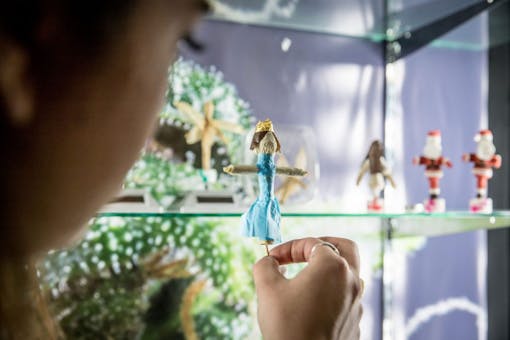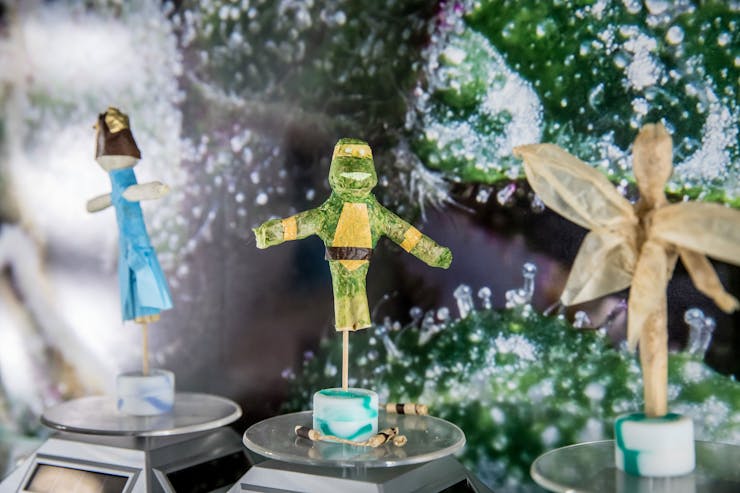Abi Roach is sitting on a couch in the upstairs offices of Toronto’s Hot Box Cafe, scrolling through her phone, trying to find a photo of her wedding cake topper. “I know I’ve got a picture of it somewhere,” she says, albums flicking by. “I’ve just got so many photos on here.” Learn About Cannabis in CanadaIt’s a photo worthy of a wait. It was not a traditional wedding cake topper. It was a smokeable bride and groom, complete in a dress and tux, rolled up by creative joint artist, Cody Van Gogh.
For a time, the Hotbox was a second home for Van Gogh, who would pull up a table and spend all day rolling different creations—cross-joints, tulips, mice, cats, fairies, dragons, dinosaurs, boats, basically anything you can imagine—to the delight of the lounges loyal regulars and curious tourists who would wander in.

Roll by Cody Van Gogh (Photo by Jesse Milns for Leafly)
Last November, Van Gogh went west. Toronto’s frequent dispensary raids and the city’s culture around cannabis inspired the move, he says. “It just wasn’t going the same way and I found Vancouver to be the best place. Toronto was good for a time but as the shops started shutting down, you started to see less people showing up for it.”
He’s settled into Vancouver now, and found a new lounge to practice his craft, but he will likely be on the move again soon. Legalization will not bring any security to his profession. In fact, it’s the opposite.
Van Gogh operates, above board, as a patient care provider, rolling for medical users that don’t have the time or ability to roll for themselves, but he worries how receptive Canadian law would be to his profession and believes he would have more secure job prospects in places like Colorado, Nevada, or California. Much of his work is commissioned, the material provided, and in a good month, he might roll up a quarter pound of cannabis. Small peanuts compared to the volume being moved by licensed producers but enough to get snared in Canada’s punitive approach to legalization, which continues to criminalize users.
Van Gogh charges for his labour, and, as he says, “I’m not making $500,000 for a license just in labour.”
“It’s just going to be another fight for me and now the stakes are a lot higher and the penalties are a lot steeper. It’s not a fight I want to keep fighting, if I can move to some place that’s more accepting, I’m open to that.”
Roach knows all about this struggle. She opened The Hot Box Cafe nearly 20 years ago and is fighting to keep it open post-prohibition. Roach is lobbying for an update to the Smoke Free Ontario Act and an exemption for cannabis lounges. She can understand Van Gogh’s desire to head south.
“I think it’s a good move for him to make. I think it’s going to be too restrictive here for the first so many years,” she says. “In California, they are a lot more open to fun, the market is a lot more open to fun, they are allowed to do packaging and billboards and all that fun stuff that we won’t be able to have here for a long, long time.”
Across from the couch where Roach is sitting, there is an illuminated display case with some of Van Gogh’s creations. He also has collections on display his hometown of Ottawa, and around Vancouver.
Shop highly rated dispensaries near you
Showing you dispensaries near“The government has really locked down what you’re able to do,” she continues. “And what he does, I would say, is very much promoting the fun of cannabis—which they do not want.”

Roll by Cody Van Gogh (Photo by Jesse Milns for Leafly)
Van Gogh is both a creative and competitive joint roller. He is a member of The National Joint League (NJL), a collective of about dozen people across North America that compete in exhibition matches and, about twice a year, a bracket-style tournament, hosted on Instagram.
“Anyone can challenge anyone else to a roll and then you just roll your joint and submit it. Whoever gets the most votes and comments wins,” he explains. “It’s a simple process but it’s a great way to discover new rollers.”

Roll by Cody Van Gogh (Photo by Jesse Milns for Leafly)
Van Gogh estimates he spends 40 to 60 hours a week rolling. He prefers to roll freehand, while others creative rollers use paper mache and figurines to shape their creations. At his new lounge in Vancouver, he gets both exposure for his craft, and, most importantly, the legal protection that’s offered to all employees.
“It’s a big tourist spot so lots of people are coming in and out and I pass cards out. A lot of people ask what I’m doing if I’m working on some big crazy thing and I’ve got pieces on hand and on display here.”
These informal meets and greets have fueled a large online following. Van Gogh has 19,000 Instagram followers, the majority of those followers being people he’s met locally and in person.
Celebrity commissions are another way to get noticed in this line of work. One of his most successful ventures in that world was with rapper Machine Gun Kelly. Last year, Van Gogh rolled a relic of Machine Gun Kelly, the cartoon featured on his debut album, Lace Up.
“It was kind of out of the blue, I only vaguely knew who Machine Gun Kelly was, to be honest, but then I started listening to his music and got into it a little bit, then afterwards when he got the joint he ended up being the coolest guy, reaching out to me, posting it on his Instagram, and being so friendly and so grateful about it that was I kind of like, ‘Man, I did really good.’ I was super happy about that.”
Van Gogh says the majority of his celebrity requests come from rappers and though he doesn’t listen to a lot of rap music, he says, he’s been listening to a lot more of it lately. He also has a bucket list of celebrities he’d like to roll for. At the top of that list? Miley Cyrus.
“Rolling for Miley would be huge. She hit a bong once and it sold on eBay for 60 grand.”
The celebrity world is good promotion for what he’s doing, but it’s not his focus or what keeps him going. Those are the commissions that come from regular people and medical patients, the smaller rolls that are less time intensive. “The creative rolls are supported by blunts and normal joints,” he says. “When you are doing it for a living, that’s huge support.”
He’s also working on a new venture, Nude Blunts, a paperless three-gram joint that burns for around 45 minutes. Last year, tight on cash, Van Gogh approached a dispensary and asked if they had any interest in stocking the paperless creations, which he rolls using a hand compression technique, no machines or presses. They said yes, and that was that.
“They flew off the shelves and they wanted more so I started doing bigger orders and that’s largely taken over my life, he says. “Even through word of mouth, there is more demand than I can support.”
“I want the joint to be the centerpiece. I want to give people something to talk about, and a reason to appreciate it.”
He has plans to turn it into a company and is currently working with an engineer on developing a patent. It’s pushed creative rolling to the background for now, but he’s eager to get going again. “That’s really what I want to and what drives me,” he says.
His other motivation is the social aspect that comes with this line of work. As technology and cannabis become more intertwined, there is something about an old school joint and the ambiance it invites.
“People overestimate how much I smoke. I’m a pretty big smoker but I mostly smoke with friends and rarely smoke by myself. I just smoke socially mostly and I think that’s why I love smoking joints,” he says. “it gets passed around, you have a conversation, you talk about it, that’s a big reason why I do this. I want the joint to be the centerpiece. I want to give people something to talk about, and a reason to appreciate it.”
Van Gogh was one of the first Canadians to join the NJL, and is quick to name others working and innovating in this field, like @findjoyintheordinary, who he has collaborated with, combining his rolls with her patented rose tip filters. The NJL also sells merch and you can order a kit that features a video of Van Gogh rolling a T-Rex and a fairy joint, and while it’s available in the US, you can’t order it in Canada.
Navigating the laws around creative cannabis work is frustrating, Van Gogh says, but he has friends in the US that have found a way to make a living this way, legally, and he might have no other choice but to join them. “It’s strange to say, but it would almost be an easier transition to get citizenship, which is crazy, it’s so hard to do in that in the US right now, but it’s less of a risk than facing a lot of the penalties they are proposing out here.”
“Until they have more solid laws for private industry and craft cannabis, I don’t think I’ll make it out here very long.”

Roll by Cody Van Gogh (Photo by Jesse Milns for Leafly)
This past May, Van Gogh was back in Toronto. The Hot Box Cafe flew him out to take part in their booth at the Lift & Co. Cannabis Expo.
“All weekend he was there teaching people how to make crazy joints and I think that was probably the highlight of Lift,” Roach says. “There was a joint artist you could sit with who could teach you how to make a dinosaur out of weed and paper.”
The booth was a recreation of the lounge, but to keep things legal, Van Gogh was rolling with hemp. “It was a huge attraction for people to see that,” he says. “Everyone was super curious about it.”
Before he became a creative roller, Van Gogh was working as a dishwasher. He was rolling cross-joints and tulips in his spare time, nothing too crazy, he says, until one day he did a cross joint with tulip on top of it.
“I realized it kind of looked like a person and I had some colored papers so I added a dress and some other details to make it look like someone I worked with. When I gave it to her, the reaction was so good it just made me want to keep going and people were asking me, ‘Could you roll this? Could you roll this?’ So I just went with it and learned as much as I could about it.’
It’s reactions like that, still, that keep him motivated. “I’ve made people cry out of happiness. I’ve made people scream. It’s crazy. It’s hard thing to explain. And, of course, he adds, “Everyone always loves smoking them.”





